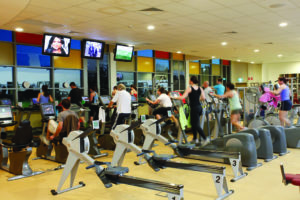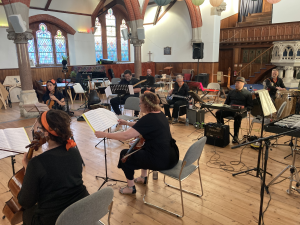Is January the most depressing month? Following the festivities of Christmas and New Year, now it’s time to buckle down and start work again, but in the U.K. and the other northern parts of our hemisphere, at least, it’s still dark and cold. Yet this can also be seen as a time for change and self-improvement.
January can be a real drag. Without Christmas or New Year celebrations to look forward to, the cold, windy, wet weather and long nights can seem especially miserable for some people. The extra money spent over the holiday season leaves a lot of people much worse off than usual. There are few cultural activities and, tired from the holiday season, fewer people are willing to do them.
On the flip side, there are opportunities to use this month to make changes, such as trying “dry January,” a different diet, or an offer at a local gym. After the excesses of the holiday season, many people feel the need for temperance.

January always sees a spike in gym membership
Dry January – just not drinking for this month – can be a positive step forward, but for some of us, it isn’t enough of a change. A 2016 report from the Mental Health Foundation found that 16.6% of adults in England report drinking to hazardous levels, with 1.2% of the adults reporting levels that could indicate alcohol dependence. The same report suggested that 3.1% of adults show signs of drug dependence. For these people, just not drinking or using is not enough for a healthy recovery, and many addicts will go through cycles of binging and abstinence even over periods of weeks and months.
On your own
Many people in addictive addiction experience intense isolation, and this in itself can be triggering. Even if the use of substances started as a social activity, the further a habit forms, the easier or more necessary it can become to isolate.

Journalist and writer, Johann Hari
Isolation can look very different for different people. For some, it means living alone and avoiding communication. For others, isolation can take the form of emotional detachment, hiding drug or alcohol use, lying, and only communicating about practical or superficial subjects until relationships dwindle and life becomes monotonous.
Though controversial, author Johann Hari’s assertion in his 2015 Ted Talk that “The opposite of addiction is connection” is not without scientific basis. According to Psychology Today, this idea played out in an experiment on rats conducted in the late 1970s and 80s. The results suggested that rats in isolation were significantly more likely to become addicted to opiate-laced water than rats in a cage with 20 others.
Beyond the obvious difference between rodents and humans, the ethical concerns, and the oversimplification of a complex matter like addiction, these findings bear out an idea that many in recovery would agree with – simply quitting wasn’t enough, and combating isolation was important. Having a strong recovery community and making real connections is often suggested to be key for addiction recovery.
How to make friends and….
Yet making new connections is difficult. In a 2019 YouGov survey, a quarter of the respondents said they had no best friend, with 1 in 10 saying they had no friends at all. Over the age of 30, more than half of respondents hadn’t made a new friend in more than a year, with this figure growing with age.
For some younger people, school, university, and an active social life make it easier to meet new people with similar interests. (Though many others still experience isolation, and this can be very intense)
Work environments might offer friendly connections, but even traditional office camaraderie is eroding – with more competition,

Isolation can affect us all
declining union membership, and remote working. Even when we are in constant contact with people we work with, it doesn’t mean that we will find real connections.
The internet, in its nascent days, offered new hope for virtual communities, and there are certainly many instances of people meeting online, in forums and special interest groups, and building meaningful, lasting relationships. Yet platforms that boast of their ability to connect, such as Facebook, Instagram, and Twitter, still need to think about their bottom lines. In recent years, changes to the platforms and underlying algorithms have prioritised quick, easy content from influencers and controversial opinions meant to trigger responses rather than help nurture communities. This is to say nothing of the scandals around false information, emotional manipulation, and interference in democracy.
Group theory
All this might paint a grim picture of atomisation that sounds like the beginning of a dystopian novel. Yet making new friends doesn’t have to be impossible.
Organisations such as the New Note Orchestra and other recovery groups around the country offer the chance to join an active community. Having a defined purpose, such as making amazing music, means that there’s less pressure to have those awkward, ice-breaking conversations, and friendships can develop naturally over time, as people bond over shared experiences.

Being a part of something is good for you
And community organisations aren’t only open to people in recovery. There are community choirs, sports groups, craft circles, and many others throughout the country.
Even without a formalised setting, mutual interests can help build friendships. If the thought of sitting with a stranger over a cup of tea, struggling to think of something to say terrifies you (it does me), try finding people with the same taste in books, films, or music. Book clubs, for instance, can have set topics for discussion, so there’s always something to fill those awkward silences. And many friends enjoy watching films together online. Even reconnecting with old friends to talk about changes in life can be possible.
Strong social connections offer several advantages. Close relationships can provide emotional and practical support, helping us cope with stress and negative life events. Having these connections is linked to better mental health, including lower rates of depression and anxiety, as well as better physical health, including a reduced risk of chronic diseases.
Humans are, after all, social animals, so it only makes sense that building meaningful connections can help us in all aspects of our lives. So maybe take this chance to support your recovery, or just beat the January blues, by joining a group or reaching out to an old friend.
Love is in the air
We will be playing LOVE FEST – a celebration of love and life, bringing people together from all over Brighton and Hove to support the Mayor’s Charities.
Where: All Saints Church, The Drive, Hove BN3 3QE
When: 14th February 2023. Show starts at 7-9pm. Doors open at 6.15pm
Tickets: £7.50 from Brighton Fringe.
Buy tickets here

